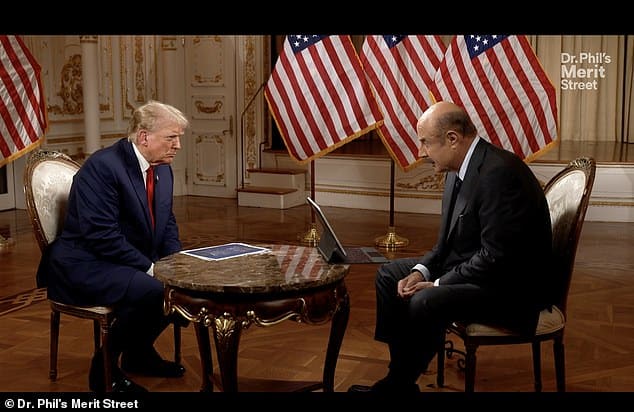Former President Donald Trump spoke emphatically in a new interview with Dr. Phil McGraw about the toll the Stormy Daniels hush money trial took on his wife Melania and said it was impacting son Barron as well.
Trump speculated that each of them likely wanted to speak to him about the difficulties, but chose not to.
‘I have a wonderful wife. I mean, it’s not easy for her to read this kind of stuff, that’s fake,’ he told the TV host. That’s totally that’s fake stuff.’
‘But that’s the way it is. It certainly is not a good thing. And it affects me more than it would if it were just about me. I wish it could be just about me,’ he told McGraw in their hour-long sit down interview from Mar-a-Lago.
Trump also hinted at the impact the trial and the constant political and legal combat had on her – revealing that it ‘wasn’t easy.’
It was his first extended interview since a Manhattan jury found him guilty on 34 counts of falsifying financial records related to the hush payments.
When Dr. Phil asked how the former first lady was holding up, Trump responded: ‘I think good,’ stretching out the word during his answer in a way that made the answer less than certain.
Former President Donald Trump told Dr. Phil McGraw that ‘sometimes revenge can be justified’ after the host pleaded with him to be a ‘hero’ and and declare that ‘it stops with me’
‘But I don’t think it’s an easy thing for her,’ he then allowed. ‘And I think if it wasn’t good, she wouldn’t want to tell me about it, to be honest with you. Because, you know, she sees that I’m fighting like hell.’
The former first lady notably did not attend Trump’s five week trial in Manhattan, instead keeping a low profile in Florida, even as a parade of supporters including family members, House members, and senators joined Trump in the courtroom.
Trump also suggested the public attention is difficult for his son Barron, 18.
As is his practice, he declined to reveal too much about his youngest child, and his only child with Melania, although he did give a hint about his college plans.
‘He’s a good boy. He’s a tall boy – very tall. He’s very tall. And he’s a great kid. He’s good looking kid. And he’s going to be going to college.’
‘He doesn’t say because he doesn’t want to hurt me,’ Trump said. ‘And he thinks it’s a possibly a hurtful conversation. But it has to affect my family,’ he lamented.
He called Barron a ‘great kid’ and a ‘good student,’ while revealing clues about his college plans.
He ‘got accepted to different colleges – some of those colleges, all of a sudden they’re rioting all over the place.’
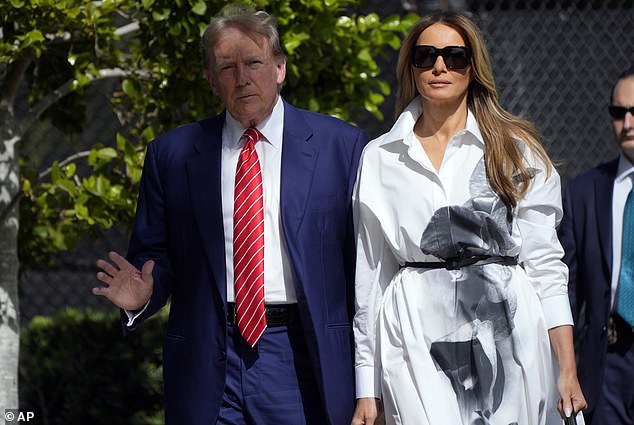
Trump said former first lady Melania Trump ‘reads this c***,’ in a rare acknowledgement of the impact of campaign coverage on her

‘He doesn’t say because he doesn’t want to hurt me,’ Trump said when asked about the impact on son Barron, who recently turned 18. ‘And he thinks it’s a possibly a hurtful conversation’
McGraw tried repeatedly in his ‘psychological’ interview with Donald Trump to be a ‘hero’ and call off his vows of retribution – only to have the former president tell him revenge can be ‘justified.’
The two longtime acquaintances had an hourlong sit-down where the the TV host repeatedly tried to probe Trump’s fear and anger, even while McGraw himself attacked Trump’s prosecution in the Stormy Daniels trial.
‘I find it to be a very different and very interesting … It’s a psychological interview that you’re doing,’ Trump told him. ‘You’re sort of being my psychiatrist, and maybe I could use a psychiatrist every once … it’s pretty cool.’
During one long portion, McGraw tried three times to persuade Trump to call off what he has said will be retribution against his enemies if he wins a second term.
‘There are headlines out there that say when you win your second term, you are going to make the people that have come after you pay. Every situation needs a hero. What a great opportunity to step up and say you know what? It stops here. It stops with me,’ Dr. Phil told him.
‘I think you’ll be impressed. We have to unite the country,’ Trump said – failing to explicitly agree.
Later, McGraw pointed to psychological research on crime and revenge. ‘Neurologically in the brain … there’s an addiction to revenge just like to opioid or whatever,’ he told Trump, a teetotaler, who responded with a ‘hmm.’
Dr. Phil described a cycle between criminals and police. ‘They see themselves as the victim and they want revenge against the person that arrested them. And then the person that arrested them gets hammered,’ he said.
‘It’s got to stop and you’re – we’re better than this. We must be better than this. And you’re big enough to do it,’ he told Trump.
‘I think you’ll be proud of the job we do,’ was Trump’s response. ‘And you know the word revenge is a very strong word, but maybe we have revenge or success.’
Then Dr. Phil quoted Pope Frances – who Trump attacked during the 2016 campaign – as writing that ‘there must be no resentment among us.
‘Well, revenge does take time, I will say that,’ Trump said. And sometimes revenge can be justified, though. I have to be honest. Sometimes it can.’
The exposition came in an interview where Trump spoke about ‘dark forces’ he claims are arrayed against him and said his darkest moments involve what wife Melania reads in the press.
The TV host tried to probe Trump about darkness he faces, in his first interview since a Manhattan jury convicted the former president on 34 counts in the Stormy Daniels trial.
‘When the crowds aren’t cheering, what’s the darkest moment you think of?’ Dr. Phil asked him.
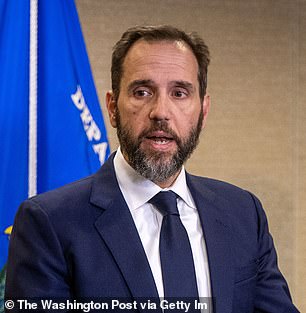

Dr. Phil pleaded with Trump to be a ‘hero’ and put a stop what he called a cycle of revenge
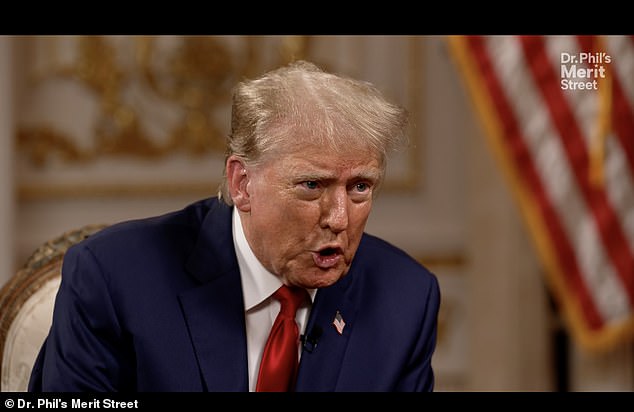
‘There are people that control him,’ Donald Trump said of President Joe Biden in an interview with TV host Dr. Phil McGraw
‘The hardest part for me is probably my family,’ Trump responded. ‘Because it’s very unfair to my family. I have a very good wife. She reads this crap. I have great kids,’ he said.
Multiple Trump family members attended the five-week trial. They included sons Don Jr. and Eric, daughter in law Lara and daughter Tiffany, although Melania did not attend his trial, which resulted in conviction on charges of falsifying business records related to paying off the porn star.
‘I have a wonderful wife. I mean, it’s not easy for her to read this kind of stuff – that’s fake – that’s fake stuff,’ he said.
Trump went on an extended discourse about Don Jr., who he called a ‘good kid’ who became the subject of accusations during the Russia probe. That got Trump railing against California Rep. Adam Schiff, who he called ‘watermelon head.’
In between Trump’s digs at Biden and the judges overseeing his criminal trials, Dr. Phil kept trying to press him with questions about the emotional impact on himself and people he cares about.
‘What is the hardest, darkest moment that you can think of in this journey?’ McGraw asked him in the interview on streaming channel Merit+.
That prompted Trump to talk about ‘evil forces’ he said were controlling President Joe Biden.
‘You have to be very strong. You’re fighting very evil forces and they’re very smart forces. There are people that control Biden. Totally true. I think I know who they are largely. But there are people that control him. They’re very smart, very energetic. Possibly they’re real believers, what their sick ideology is. But you have to be smart and you have to have confidence,’ Trump told him.
At one point Trump called attention to the questions that touched on emotion.
‘It’s a psychological interview that you’re doing. You’re sort of being my psychiatrist,’ Trump told his interviewer. Dr. Phil called it a ‘no holds barred’ interview from Trump’s Mar-a-Lago home.
Dr. Phil’s first comment to Trump as the interview began was that ‘you look well,’ which prompted an answer that had Trump mentioning ‘corrupt judges’ and ‘corrupt politicians’ within seconds. Trump also used the interview to settle scores with figures dating back years, including former British intelligence officer Christopher Steele.
The interviewer put Trump at ease with an early blast at government prosecutions of him.
‘They need to stop this. They need to stop pursuing you,’ he told Trump. McGraw started his career working in ‘trial sciences’ advising lawyers how to pitch to juries, and said he had a particular interest in the dynamics of the trial setting.
Trump spent part of the interview inveighing against the gag order Judge Juan Merchan imposed in the case. Both he and McGraw ended up speaking about witnesses and potential witnesses in the case.
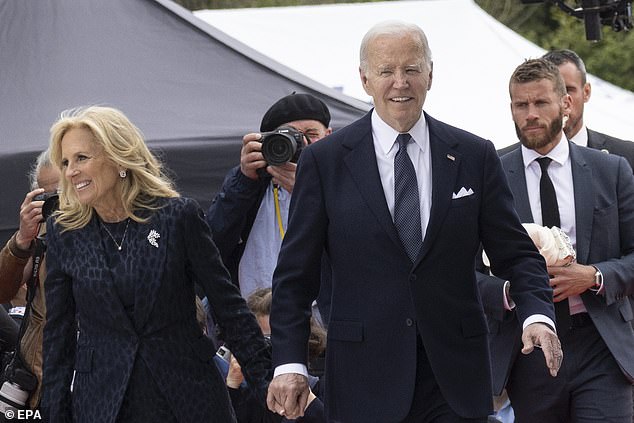
‘I do think he knows what’s going on. I think he’s sort of an evil guy,’ Trump said of President Biden at one point

Trump spoke about the impact on son Barron, who graduated from high school this spring

‘I even lost Oprah. Oprah used to like me so much,’ Trump told Dr. Phil
McGraw said the judge ‘muzzled’ the case, and took a shot at former Trump fixer Michael Cohen, a star witness as well as ex-National Enquirer CEO David Pecker, another witness, reaching a non-prosecution agreement.
Trump complained about the pressure on former Trump Organization CFO Allen Weisselberg, who both sides had considered calling from Rikers Island prison to testify.
Trump also blasted the E. Jean Carroll defamation suit, after a jury finding him liable for sexual abuse.
He said he had ‘no idea who she is. I had to pay $91 million and that judge was just as bad, just as corrupt,’ Trump said.
In the hush money case, where Trump never took the stand, ‘I would have loved to have testified. I wanted to. I’m telling you: they had to hold me back,’ he said.
He also complimented Judge Aileen Cannon, the judge he appointed who is overseeing his classified documents case. He called her ‘a very brilliant judge in Florida.’
On foreign policy, Trump complained about the Biden administration’s recent move to allow Ukraine to use U.S. weapons to strike inside Russia closer to the Ukrainian border.
‘I’ll get the war in Ukraine settled and one by the time I take office as president-elect,’ Trump said, vowing to act on the world stage even in the last months of Biden’s term.
Trump spoke about Dr. Phil’s former colleague and partner Oprah Winfrey.
Oprah used to really like me. She was here many times. She loved my key lime pie. We have key lime pie – and she loved a lot of things about Mara Lago,’ Trump said.
‘We’ve sort of lost contact as the expression goes,’ Trump said.
Trump came back to Winfrey later in the interview. Winfrey famously threw her support to Barack Obama in 2008 and interviewed Trump decades ago about his White House ambitions.
‘I even lost Oprah. Oprah used to like me so much,’ he told Dr. Phil. ‘And you know I haven’t spoken to her since. But she’s a good person. Please give her my regards.’
Trump tore into opponents during the interview, settling scores with people dating to the Russia probe. ‘I do think he knows what’s going on. I think he’s sort of an evil guy,’ Trump said of President Biden at one point.
He called Rep. Adam Schiff ‘watermelon head.’
‘Very unattractive guy both inside and outside,’ Trump said of the California Senate primary winner.
Dr. Phil told a studio audience that he knew Trump was going to spend much of the interview getting his message out.
‘It’s kinda like talking to a waiter and they’ve got the specials. They’re going to give you those specials. And it doesn’t matter what you want, they’re going to give you those specials. … and if you interrupt them on number 12 out of 15, they’re going to start back up at the top,’ he said.

